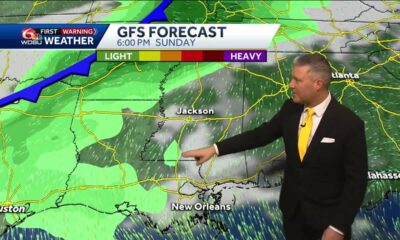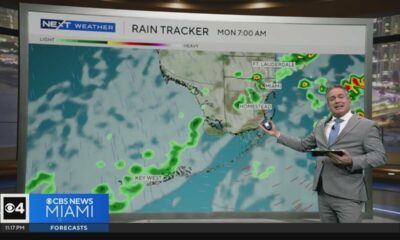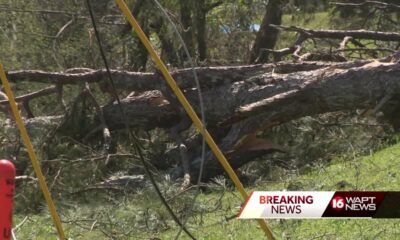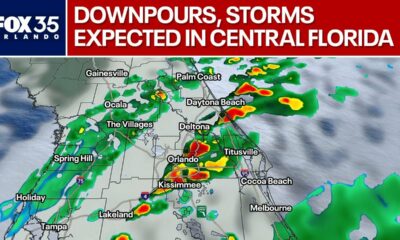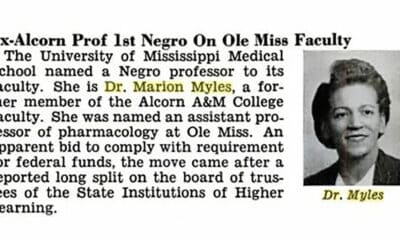News from the South - Kentucky News Feed
WLKY 6 a.m. weather forecast Feb. 12, 2025
SUMMARY: Meteorologist Susanne Horgan reports fog and drizzle this morning, with temperatures around freezing in some areas, including 32°F in Corydon and Shelbyville. The International Airport registers 34°F but feels colder due to wind chill. Light drizzle is observed along Bardstown Road and nearby areas. The forecast indicates that this morning’s drizzle will transition to more widespread rainfall later in the day, with rain continuing into the evening. A heavy rainfall concern with potential flooding is expected on Saturday, especially in southern communities, followed by a transition to snow showers as colder air arrives.

WLKY 6 a.m. weather forecast Feb. 12, 2025
Subscribe to WLKY on YouTube now for more: http://bit.ly/1e5KyMO
Get more Louisville news: http://www.wlky.com
Like us: http://www.facebook.com/wlkynews
Follow us: http://twitter.com/WLKY
Instagram: https://www.instagram.com/wlky/
News from the South - Kentucky News Feed
Evening Forecast 3/16/2025
SUMMARY: TITLE: Evening Forecast 3/16/2025
MAIN CONTENT: Today’s forecast is characterized by lingering cloud cover following recent rain, with a gradual drying trend. Drizzle may occur overnight, but no significant rain is expected. Clouds will partly clear by morning, giving way to sunshine for St. Patrick’s Day, with afternoon highs in the low to mid-50s. Overnight lows will dip near freezing. Warmer temperatures in the 70s are anticipated midweek before a new weather system brings showers and possible storms Wednesday night into Thursday, though primarily rain is expected. The upcoming days promise clearer skies and milder weather ahead.

Evening Forecast 3/16/2025
Subscribe to FOX 56 News on YouTube: https://www.youtube.com/c/FOX56News/?sub_confirmation=1
See more Crime Stoppers stories: https://FOX56News.com/news/crime-stoppers/
Stay informed about central Kentucky news, weather, and sports! Follow FOX 56 on our website and social channels:
https://www.FOX56News.com
https://www.youtube.com/c/FOX56News
https://www.facebook.com/FOX56News
https://twitter.com/FOX56News
https://www.instagram.com/FOX56News
https://www.linkedin.com/company/FOX56News
News from the South - Kentucky News Feed
Evening Forecast 3/15/2024
SUMMARY: In the evening forecast for March 15, 2024, heavy rain has impacted the region, with gusty winds but no severe weather, primarily affecting areas in Kentucky. Rainfall continues steadily, particularly in Northeastern and Southern Kentucky, while severe weather warnings are focused on Tennessee and surrounding states. A flood watch remains in effect until 8 AM, and gusty winds could reach up to 60 mph overnight. Tomorrow afternoon may bring strong to severe thunderstorms, especially in Eastern Kentucky. Following a cooler St. Patrick’s Day, warmer sunny weather is expected on Tuesday, with temperatures reaching 70 degrees.

Evening Forecast 3/15/2024
Subscribe to FOX 56 News on YouTube: https://www.youtube.com/c/FOX56News/?sub_confirmation=1
See more Crime Stoppers stories: https://FOX56News.com/news/crime-stoppers/
Stay informed about central Kentucky news, weather, and sports! Follow FOX 56 on our website and social channels:
https://www.FOX56News.com
https://www.youtube.com/c/FOX56News
https://www.facebook.com/FOX56News
https://twitter.com/FOX56News
https://www.instagram.com/FOX56News
https://www.linkedin.com/company/FOX56News
News from the South - Kentucky News Feed
Sacred Heart wins 5th consecutive state championship
SUMMARY: Sacred Heart clinched its fifth consecutive state championship, defeating George Rogers Clark 65-60 in a thrilling final in Lexington. The Valkyries, led by LSU signee Zach Johnson, initially took a strong lead but faced a tough challenge as GRC led at halftime, 31-27. The game remained close, with the Cardinals holding a slim lead in the fourth quarter. Johnson ultimately scored 21 points, while teammate Jordan added 19, including crucial free throws that secured the win. Head coach Donna Moore praised the team’s defensive adjustment and preparation, emphasizing their focus on free throw practice leading up to the game.

Sacred Heart wins 5th consecutive state championship
Subscribe to WLKY on YouTube now for more: http://bit.ly/1e5KyMO
Get more Louisville news: http://www.wlky.com
Like us: http://www.facebook.com/wlkynews
Follow us: http://twitter.com/WLKY
Instagram: https://www.instagram.com/wlky/
-

 News from the South - Oklahoma News Feed6 days ago
News from the South - Oklahoma News Feed6 days agoLong Story Short: Bill to Boost Rural Mental Health and Diversion Programs Advances
-

 News from the South - North Carolina News Feed7 days ago
News from the South - North Carolina News Feed7 days agoLumbee tribe may finally receive long-sought federal recognition
-

 News from the South - Florida News Feed7 days ago
News from the South - Florida News Feed7 days agoHeavy rain, gusty winds expected in Central Florida
-

 News from the South - Oklahoma News Feed5 days ago
News from the South - Oklahoma News Feed5 days agoBlood stain leads to 2 arrests in 1997 Oklahoma cold case
-

 News from the South - Alabama News Feed6 days ago
News from the South - Alabama News Feed6 days agoCannabis cultivator celebrates Alabama licensing ruling
-

 Mississippi Today4 days ago
Mississippi Today4 days agoOn this day in 1965
-

 News from the South - Alabama News Feed7 days ago
News from the South - Alabama News Feed7 days agoSevere storms in Alabama's forecast Saturday with multiple threats including a tornado risk.
-

 News from the South - Oklahoma News Feed6 days ago
News from the South - Oklahoma News Feed6 days agoFormer DHS worker charged with kidnapping says ‘another personality’ caused her to take the child

